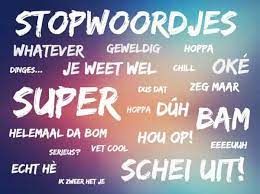Gap words in Dutch: stopwoordjes!

Eh?
We have all heard the following words used by people in English: you know, actually, so, okay, I guess, well, truly, really, totally, awesome, like, about, absolutely. And many more. They don’t always add to the meaning or intention of what you want to say, but often unconsciously, creep into our way of speaking. They are also referred to as gap words. The picture above, with some gap words, comes from the website Liefs Marielle.
Camouflage
The good news (or bad news, if you will) is that we have them in Dutch too! Gap words are words to fill in an awkward pause in a conversation or camouflage the insecurity of the speaker. Not surprisingly they are also called filler words. They fill up the silent moments in which the speaker does not always have a wise word at hand. I think gap or filler words are also used, again unconsciously, to make some kind of impression on the other during social meetings. Somehow these words ‘help’ the speaker sound more at ease during a nerve-wracking (job) interview. Who hasn’t seen people on TV being interviewed and using gap words over and over again until you get so annoyed that you zap the speaker away? They may have been very nervous and wanted to compensate that by using casual speech.
Stopwoordjes
In Dutch we call gap words ‘stopwoordjes’. They’re okay, up to a degree. The limit is reached when one overuses a word and you cannot hear anything else but that gap word. Quite annoying! But at the same time ‘stopwoordjes’ can make communication sound more natural and less stiff. In fact, speaking is larded with these filler words because we hardly finish a sentence, contrary to what we do in writing. We may have a conversation that sounds like this in Dutch:
Vraag: Wat vind jij nou van die nieuwe serie op, eh, ik geloof NPO1, weet je wel, van de VARA?
Antwoord: Nou, ja, wel aardig, een beetje … eh … wat zal ik zeggen, eigenlijk wel leuk, maar een beetje moeilijk te volgen soms, vind je niet? En eh, wat vind jij?
Some examples
- Nou -> Nou, het is tijd om te gaan! -> Well, it is time to go!
- Nou ja -> Nou ja, vind ik niet. -> Well, I don’t think so.
- Nou ja, kijk -> Nou ja, kijk, het zit zo. -> Well, look, this is how it is.
- Weet je -> Weet je, ik ben het niet met je eens. You know, I don’t agree with you.
- Oké -> Okay
- Maar goed… -> Het is verdrietig dat hij is overleden. Maar goed, hij was al wel oud.
- Eigenlijk – Actually
- Echt – Really
- Gewoon – (Simply)
- Even – Just?
- Tja – Oh well
- Zeker – Sure
- Ja hoor – Yes, sure/certainly
- (Ja) hè? (Don’t you think?) -> Ja, hè? Dat is mooi!
- Zeg, … (Listen) ->
‘Stopwoorden’ are obviously needed, because I don’t think there is a single person in the world who does not use a gap word now and then. It would, however, be good if we were more aware of them, so that we can throw in some other words to fill voids and make our conversation more poetic. That way gap words could be loved rather than hated in communication!

